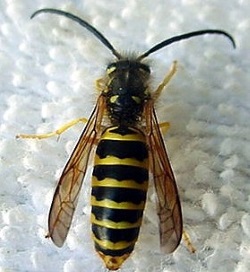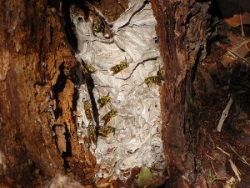Biology & Reproduction
 The name yellow jacket refers to the yellow and black bands on the tail, but some species are actually black and white. They are very social and live in colonies. A colony consists of the workers, males, and queens. Only the queens will overwinter. In the spring, she’ll construct a paper carton nest about the size of a golf ball, similar to a paper mache ball. Most yellow jackets build nests underground, in wall voids, attics, shrubbery, and hollow logs. One egg is laid in each and the queen will feed them throughout their growth, taking about 30 days. Workers will then emerge and take over the work of the queen, other than egg lying. Workers will continuously make the nest bigger and will usually contain 1,000 to 4,000 workers at its peak. Once new queens and males emerge and leave the nest to mate, the current nest will begin to decline. Those new queens will overwinter while the first queen, workers, and males will die and complete the seasonal cycle.
The name yellow jacket refers to the yellow and black bands on the tail, but some species are actually black and white. They are very social and live in colonies. A colony consists of the workers, males, and queens. Only the queens will overwinter. In the spring, she’ll construct a paper carton nest about the size of a golf ball, similar to a paper mache ball. Most yellow jackets build nests underground, in wall voids, attics, shrubbery, and hollow logs. One egg is laid in each and the queen will feed them throughout their growth, taking about 30 days. Workers will then emerge and take over the work of the queen, other than egg lying. Workers will continuously make the nest bigger and will usually contain 1,000 to 4,000 workers at its peak. Once new queens and males emerge and leave the nest to mate, the current nest will begin to decline. Those new queens will overwinter while the first queen, workers, and males will die and complete the seasonal cycle.
Habits
Due to the large colony size and defensive nature, yellow jackets are very aggressive. They often have guards at their nest entrances, and the colony can easily be disturbed by rapid movement and vibrations near the nest. Unlike other types of bees and wasps, yellow jackets do not lose their stinger, so they are capable of stinging multiple times. An alarm chemical is released upon stinging that causes others to attack. Yellow jackets tend to be more aggressive in fall and late fall.
Control
 Yellow jackets are highly beneficial insects because they prey on pest species. They can be dangerous though, especially for people with bee sensitivity. Other than other bugs, yellow jackets also scavenge for protein and sugars at garbage cans and picnic sites and where fruit has fallen from trees. Be aware of any nests or potential feedings sites. Using a noisy weed whacker or lawn mower around their nests can send them on high alert and on the attack. If yellow jackets are nesting or feeding in or around your home, don’t attempt to control it yourself. Our technicians are trained professionals and will provide treatment to keep you and your family safe.
Yellow jackets are highly beneficial insects because they prey on pest species. They can be dangerous though, especially for people with bee sensitivity. Other than other bugs, yellow jackets also scavenge for protein and sugars at garbage cans and picnic sites and where fruit has fallen from trees. Be aware of any nests or potential feedings sites. Using a noisy weed whacker or lawn mower around their nests can send them on high alert and on the attack. If yellow jackets are nesting or feeding in or around your home, don’t attempt to control it yourself. Our technicians are trained professionals and will provide treatment to keep you and your family safe.

